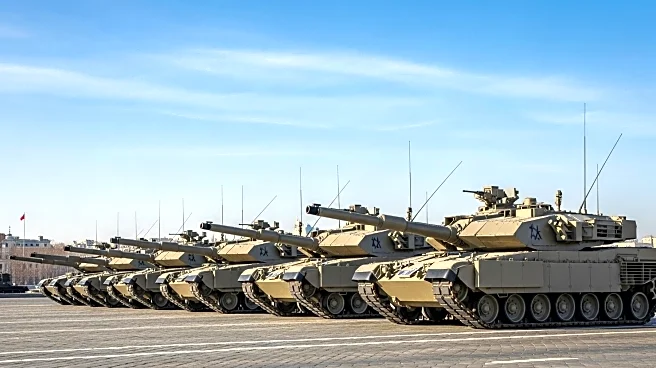What is the story about?
What's Happening?
Beijing is preparing for a grand military parade orchestrated by President Xi Jinping, marking 80 years since Japan's surrender in World War II. The event is set to showcase China's military prowess, including new hypersonic weapons and unmanned underwater drones. The parade is attended by 26 foreign heads of state, including Russia's Vladimir Putin and North Korea's Kim Jong Un, which is seen as a diplomatic win for Xi. The parade coincides with the Shanghai Cooperation Organisation summit, where Xi aims to project power and challenge the United States' influence. The event also serves as a domestic rallying cry amid China's economic struggles, including youth unemployment and declining house prices.
Why It's Important?
The military parade is significant as it underscores China's growing military capabilities and Xi Jinping's diplomatic influence. By hosting leaders like Putin and Kim Jong Un, China is positioning itself as a central player in global geopolitics, potentially challenging U.S. dominance. Domestically, the parade aims to foster national pride and unity at a time when China faces economic challenges, including the impact of tariffs imposed by President Trump. The event also highlights China's efforts to control public sentiment and maintain stability, as seen in the extensive security measures taken in Beijing.
What's Next?
Following the parade, China may continue to strengthen its diplomatic ties with countries attending the event, potentially leading to new economic and strategic partnerships. The focus on military strength could prompt reactions from Western nations, particularly the United States, as they assess China's growing influence. Domestically, the government may intensify efforts to address economic issues and maintain public support, possibly through further anti-corruption measures and economic reforms.
Beyond the Headlines
The parade reflects deeper geopolitical shifts, with China seeking to redefine its role on the world stage. The presence of leaders like Kim Jong Un and Vladimir Putin suggests a potential realignment of global alliances, which could have long-term implications for international relations. Additionally, the event highlights the Chinese Communist Party's emphasis on historical narratives to bolster national identity and support for the regime.














